Page one opened with a teacher identified as A.J.S. (Alfred J. Standing) reminiscing about his time teaching Native Americans before he came to Carlisle. Also on the page was an article signed by "G. Le R. B." (George Le Roy Brown) on the civilization of the Indians, comparing it to the conquests of the Roman Empire and its assimilation of less…
Students Writing Home
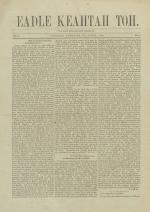
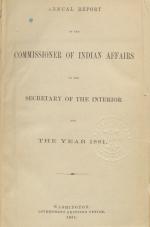
An excerpt from the Annual Report of the Commissioner of Indian Affairs to the Secretary of the Interior for the fiscal year ending 1881, containing the second annual report of the Carlisle Indian School. The lengthy report includes discussions of curriculum, student recruitment, the school's campus, the success of the sending students on…
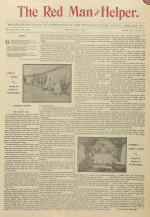
A description of this document is not currently available.
Note: This issue was also published as The Red Man (Vol. 16, No. 4) and Helper (Vol. 15, No. 37).
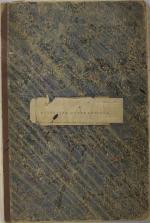
This ledger contains names of students (sometimes on printed rosters) and names, addresses, and sometimes relationships of persons to whom students wrote. The Address Book for Home Letters is located at the National Archives and Records Administration, Record Group 75, Series 1340.…
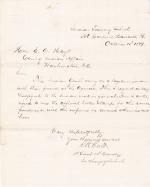
Richard Henry Pratt writes to Commissioner of Indian Affairs Ezra Hayt asking whether official postage stamps can be used to send students' mail to their families and friends at home in the western Agencies.
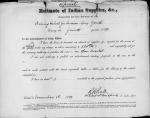
Richard H. Pratt submits a "Special" Estimate of Supplies for the fourth quarter of fiscal year 1879 amounting to $24.99, allowing Pratt to purchase postage stamps. The form includes a note that the postage stamps will allow students to write to their family and friends. An explanatory cover letter is included
Note: This item was copied…
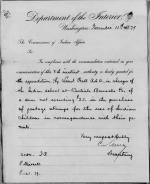
Secretary of the Interior Carl Schurz grants Richard Henry Pratt authority to purchase $25 of stamps for students to use to correspond with their parents.
Note: This item was copied from U.S. National Archives microfilm reels (M234), which were filmed from the original documents found in Record Group 75, Entry 79, "Letters Received by…
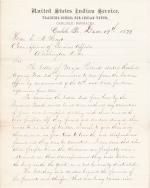
Richard Henry Pratt writes to Commissioner of Indian Affairs Ezra Hayt, responding to a forwarded letter from Major Pollock of the Rosebud Agency. Pratt argues against screening students' letters home, suggesting that it would harm the government's relationship with their parents and chiefs. Pratt also addresses students' written complaints…
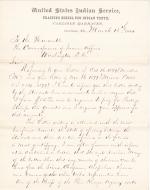
Richard Henry Pratt requests additional money for postage of student letters from the Commissioner of Indian Affairs. Pratt states that letter-writing increases student morale and promotes the school's reputation among their families and tribes.
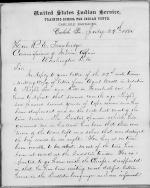
Richard Henry Pratt provides a report on the health of several Rosebud Sioux students. He informs Commissioner of Indian Affairs R. E. Trowbridge that Thigh's son is suffering from tapeworm, and Pratt will send him home if he's still sick when Reverend Robinson, a missionary from Rosebud who's visiting the school, returns to the agency. Kills…
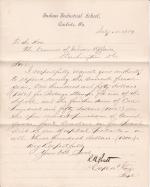
Richard Henry Pratt requests authority to purchase $150 dollars worth of postage stamps and another $150 in the open market for canned goods, fruit, crackers, etc. for the special diet of hospital patients.
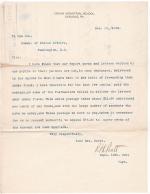
Richard Henry Pratt requests additional funding in order to pay postage for sending letters from students as well as their report cards to their parents. Pratt notes that Agents and Postmasters have in some cases not delivered the letters when sent under frank.
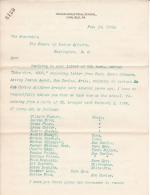
Richard Henry Pratt responds to an Office of Indian Affairs letter enclosing a letter from Acting Agent Captain Lewis Johnson regarding students from the San Carlos Agency at the Carlisle Indian School. Pratt provides a list of the students who remain at Carlisle and notes that they have all consented to remain at Carlisle beyond their initial…
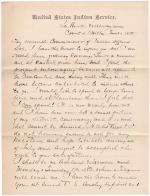
T. S. Ansley writes to Thomas J. Morgan that he has arrived at the La Pointe Agency and that a number of Carlisle students are from that agency. As the students seem contented and doing well, and writing home in ways to induce others to attend Carlisle.
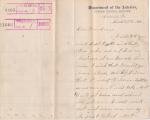
Mary M. Kennedy provides Thomas J. Morgan two letters regarding claims made by students at Carlisle regarding their punishment over complaints that they are not receiving enough food to eat. She further states that Richard Henry Pratt punishes students when he hears they have written home complaining and to not show the letters to him.
…
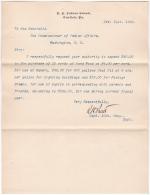
Captain Richard H. Pratt requests to spend $203.00 on the purchase of hardwood for the bakery, coal oil for lighting buildings, and postage stamps for students.
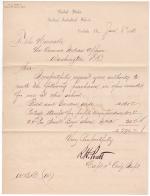
Captain Richard H. Pratt requests to spend $290 on the purchase of field and garden seeds, postage stamps for students, and small boys' shoes.
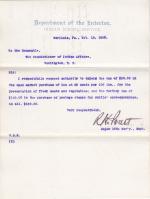
Richard Henry Pratt requests authority to purchase ice on the open market for the preservation of fresh meats and vegetables as well as stamps for student's letters.
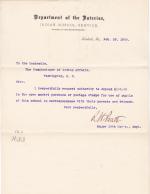
Richard Henry Pratt requests authority to purchase postage stamps for students to correspond with their parents and friends.
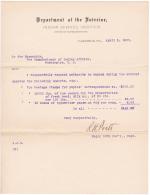
Richard Henry Pratt requests authority to purchase postage for students correspondence, 12,000 pounds of ice for preserving food, and 10 reams of typewriter paper.
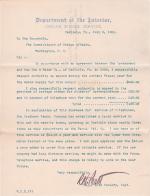
Richard Henry Pratt requests authority to purchase stamps for student correspondence as well as pay annual contracts for water and telephone service.
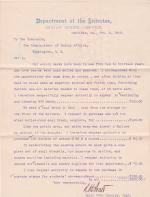
Richard Henry Pratt requests various authorities to varnish and clean schoolroom desks, purchase a coal truck, purchase 1000 bushels of onions, as well as purchasing utensils and materials for establishing a cooking school, and stamps for student's correspondence.
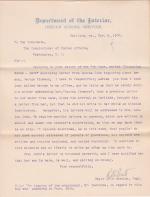
Richard Henry Pratt responds to an inquiry from Louisa John that her son George Jimeson is at the Carlisle Indian School having transferred from the Lincoln Institute. His letters home were addressed to Louisa Jimeson.
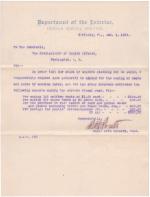
Richard Henry Pratt requests authority to expend $200 in outside labor in making uniform coats and pants as well as purchasing farm and garden seeds and postage for student correspondence.
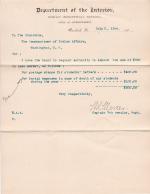
Request by William A. Mercer to purchase on the open market postage stamps for student letters and burial expenses in case of student deaths during the year.
